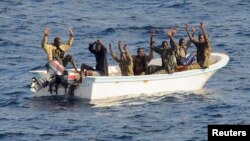The number of pirate attacks worldwide has fallen in the first half of 2013. However, maritime officials are warning that the waters off West Africa are growing more dangerous.
International Maritime Bureau Director Pottengal Mukundan highlighted the findings of the latest piracy report.
“We have had 138 incidents compared to 177 incidents for the same period in 2012. This is largely because of the reduction in the attacks off the Horn of Africa, which accounted previously for around 50 percent of the worldwide attacks,” he said.
The reduction is due to a number of reasons, including the international effort that’s been underway off the Horn of Africa. That’s dealt a major blow to Somali pirates.
“The invaluable roll played by the navies in these waters in collecting intelligence – in pursuing suspected mother ships -- interdicting them – and dealing with them before they can pose a threat to merchant shipping. That is a role which is unique to the navies. No one else can play that role,” he said.
He also credited a specific code of conduct that vessels now follow when sailing through risky areas – an increase in private security guards on board ships – and an overall improvement in security within Somalia.
“It is the role played by the new government in Somalia, which has been there since September 2012, which has given for the first time in decades a feeling of stability and security within Somalia itself. And if that continues, then it will make it very difficult for the pirates to have a safe haven to take their hijacked vessels to,” he said.
Mukundan said that while progress is being made against piracy off the Horn of Africa, things continue to worsen on the other side of the continent.
“The two main risk areas on the West Coast of Africa [are] the hijacking of product tankers as far away as Ivory Coast in order to steal a small portion of the cargo – usually two to five thousand tons of oil. And in that time the crew are subject to a certain degree of violence. The second disturbing trend in the Gulf of Guinea is the kidnapping of crew members from their vessels,” he said.
The crew members abducted in the Gulf of Guinea are usually released after about six weeks when ransom is paid. That compares to crews abducted off the Horn of Africa who may be held for as long as two years. Mukundan has called on West African nations to act.
“These kinds of crimes can be dealt with proper law enforcement actions taken by the coastal states, particularly Nigeria. They have already put a few gangs – they have caught them and they are now on trial in Nigeria. But clearly more needs to be done,” he said.
The International Maritime Bureau Director warned against complacency following success in reducing pirate attacks. Mukundan says that would be disastrous for international shipping and crew members.
International Maritime Bureau Director Pottengal Mukundan highlighted the findings of the latest piracy report.
“We have had 138 incidents compared to 177 incidents for the same period in 2012. This is largely because of the reduction in the attacks off the Horn of Africa, which accounted previously for around 50 percent of the worldwide attacks,” he said.
The reduction is due to a number of reasons, including the international effort that’s been underway off the Horn of Africa. That’s dealt a major blow to Somali pirates.
“The invaluable roll played by the navies in these waters in collecting intelligence – in pursuing suspected mother ships -- interdicting them – and dealing with them before they can pose a threat to merchant shipping. That is a role which is unique to the navies. No one else can play that role,” he said.
He also credited a specific code of conduct that vessels now follow when sailing through risky areas – an increase in private security guards on board ships – and an overall improvement in security within Somalia.
“It is the role played by the new government in Somalia, which has been there since September 2012, which has given for the first time in decades a feeling of stability and security within Somalia itself. And if that continues, then it will make it very difficult for the pirates to have a safe haven to take their hijacked vessels to,” he said.
Mukundan said that while progress is being made against piracy off the Horn of Africa, things continue to worsen on the other side of the continent.
“The two main risk areas on the West Coast of Africa [are] the hijacking of product tankers as far away as Ivory Coast in order to steal a small portion of the cargo – usually two to five thousand tons of oil. And in that time the crew are subject to a certain degree of violence. The second disturbing trend in the Gulf of Guinea is the kidnapping of crew members from their vessels,” he said.
The crew members abducted in the Gulf of Guinea are usually released after about six weeks when ransom is paid. That compares to crews abducted off the Horn of Africa who may be held for as long as two years. Mukundan has called on West African nations to act.
“These kinds of crimes can be dealt with proper law enforcement actions taken by the coastal states, particularly Nigeria. They have already put a few gangs – they have caught them and they are now on trial in Nigeria. But clearly more needs to be done,” he said.
The International Maritime Bureau Director warned against complacency following success in reducing pirate attacks. Mukundan says that would be disastrous for international shipping and crew members.





